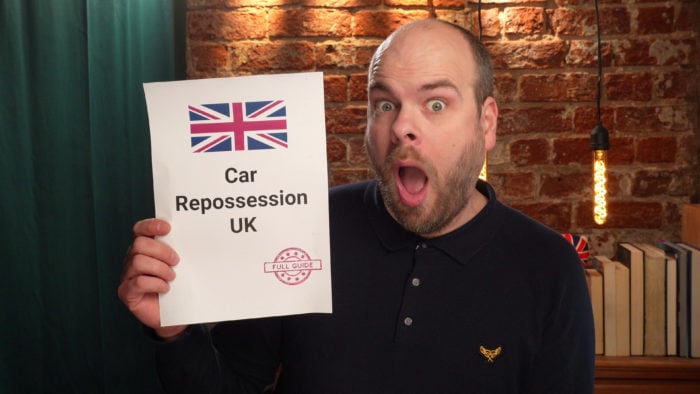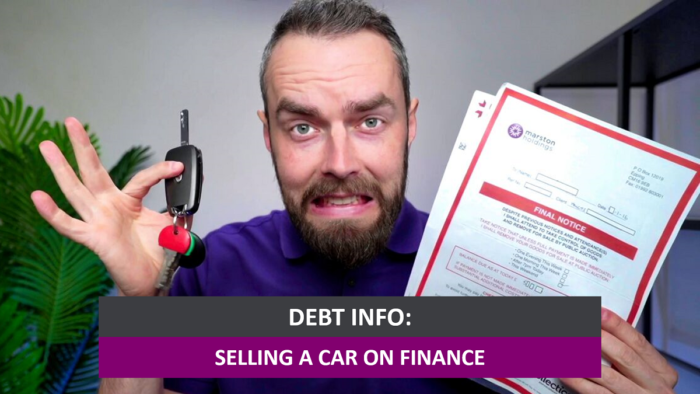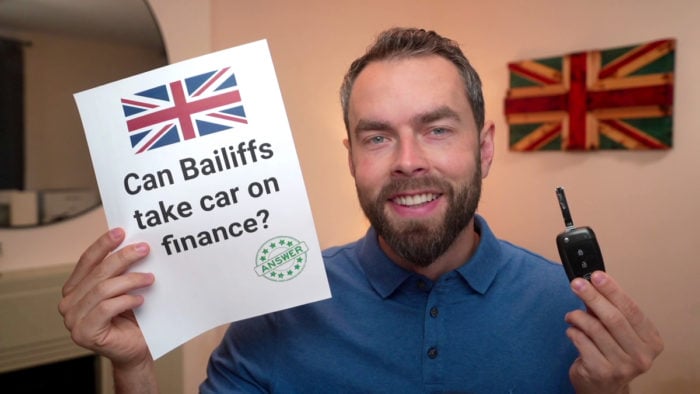Car Repossession in the UK – Complete Guide
For free & impartial money advice you can visit MoneyHelper. We work with The Debt Advice Service who provide information about your options. This isn’t a full fact-find, some debt solutions may not be suitable in all circumstances, ongoing fees might apply & your credit rating may be affected.

For free & impartial money advice you can visit MoneyHelper. We work with The Debt Advice Service who provide information about your options. This isn’t a full fact-find, some debt solutions may not be suitable in all circumstances, ongoing fees might apply & your credit rating may be affected.
Understanding car finance and repossession laws in the UK can be tough. Are you worried about making your car payments? Are you scared your car might be taken away? Are these contracts puzzling for you?
You’ve come to the right place. Each month, over 170,000 people visit our website seeking advice on debt issues.
In this straightforward guide, we’ll talk about:
- Steps taken when you can’t meet car finance payments
- How debt changes when a car is taken back
- How missed payments affect your credit score
- Ways to stop car repossession in the UK
- Your rights during car repossession
We know it’s a hard place to be in when you can’t afford your car payments – the worry of losing your car and the confusion over contracts can be a lot to handle. StepChange stresses the need for professional debt advice, noting that 60% of adults in financial trouble hesitate to seek help.1
Luckily, you’re not alone; we are here to help you understand the rules and find the best solution. Let’s start looking at your options.
What happens when you have car finance with defaults?
It is estimated that around 80% of all new cars bought are with a type of Hire Purchase agreement. This is a contract where the buyer will purchase the vehicle by making monthly payments, and is technically leasing it in the meantime. The companies providing these agreements should be authorised and regulated by the Financial Conduct Authority.
If you think that your creditor has broken some of these rules, you may be able to complain to the Financial Ombudsman Service and seek compensation.
So, what can happen if you have car finance and default on your repayments?
The vehicle remains the property of the finance provider, but they must follow a series of steps before they can look to complete a car repossession. You won’t have the vehicle repossessed overnight.
These debt collection steps are:
1) Reminder notice
When you first miss a payment, the lender will write to notify you that a payment was missed. They will ask you to pay quickly. The letter may include some scary threats or talk of legal action.
2) Arrears notice
If you miss a second repayment, the hire purchase finance provider can then send a notice of arrears. This is a letter informing you that you are in arrears and should contact them to arrange repayments. They can only send these letters every six months, so you won’t be bombarded with them.
3) Default notice
If you are still not forthcoming to negotiate a solution, they can then send a default notice and inform you that they will take legal action. The default is applied to your credit file.
They may then take legal action to recover what you owe and the car – more on this later.
4) Agreement termination
Lenders may then terminate the agreement and attempt to take repossession of the vehicle. The company remains the legal owner of the vehicle – and they may or may not need a court order to take back possession.
Read on!
What happens to the debt when a car is repossessed?
If your finance car is repossessed, it will be sold at a car repossession auction. The money generated for vehicles at these auctions is typically below the market value.
This is bad news for the debtor because the funds raised are used towards clearing the remaining balance of the finance agreement.
Any shortfall between the sale value and the remaining amount on the agreement becomes a debt that must be paid by the consumer. The car finance provider can then apply to the courts for a County Court Judgement that requests you pay.
If your circumstances mean you are unable to pay, you may be able to arrange an affordable payment plan.
If no agreement is made, they could then try to enforce the remaining debt with bailiffs or an attachment of earnings order.
How a debt solution could help
Some debt solutions can:
- Stop nasty calls from creditors
- Freeze interest and charges
- Reduce your monthly payments
A few debt solutions can even result in writing off some of your debt.
Here’s an example:
Situation
| Monthly income | £2,504 |
| Monthly expenses | £2,345 |
| Total debt | £32,049 |
Monthly debt repayments
| Before | £587 |
| After | £158 |
£429 reduction in monthly payments
If you want to learn what debt solutions are available to you, click the button below to get started.
How many missed payments before a car is repossessed?
Based on the steps included in the strict debt collection process, you will need to miss at least two payments before the lender can even consider repossessing the vehicle.
However, it is more likely you will have to miss more than this before it gets to this stage, especially if a legal order is required.
You cannot sell the vehicle to make future payments because you are not the legal owner.
» TAKE ACTION NOW: Fill out the short debt form
What are my rights for car repossession?
Unfortunately, the law on repossessions is quite vague which can mean that it is difficult to know what your creditors can and can’t do.
Unless you’re in Scotland! In Scotland, any car repossession requires a court order, no matter how long you have had the car or how little you have paid. If your car is repossessed without a court order, you are owed serious compensation!
If you think that your car is going to be repossessed, being aware of your rights can help make the process less stressful and make sure that your creditors don’t take advantage!
1) If you have paid more than 1/3 of the total amount payable
First of all, some types of repossession must have a court order granted for it to be legal. If no court order has been granted, then whoever repossessed your car has commited a crime!
For your creditor to need a court order, you must have paid a third of the total price of the car to your creditor. This payment or payments must have been made through a hire purchase or conditional sale agreement that is regulated by the Consumer Credit Act.
If you think that your creditor repossessed your car without the required court order, you may be able to claim compensation. You may even be able to write off any remaining car debt so double check your contract!
2) If you have paid less than 1/3 of the total amount payable
If you have paid less than a third of the total price of your car, your creditors do not need a court order in order to repossess it.
However, you should still seek advice to see if there is anything that you can do.
3) If you have paid more than 1/2 of the total amount payable
If you have paid at least 50% of the total price of your car, you have the option to voluntarily terminate your finance agreement with your creditor. This means that you just need to give your keys back to your creditor and leave with nothing else to pay.
There are some conditions!
You need to return the car in a reasonable condition. This means that expected ‘wear and tear’ damage from the car’s age and mileage is acceptable, but anything more than this will likely result in a fee from your creditor.
Keep in mind that voluntarily terminating your contract will be noted on your credit file and may have a negative impact on your ability to get finance on a car in the next six years.
When in doubt, I recommend that you seek advice. Citizens Advice and StepChange both offer free advice for hire purchase agreements and could find you an appropriate debt management plan.
Thousands have already tackled their debt
Every day our partners, The Debt Advice Service, help people find out whether they can lower their repayments and finally tackle or write off some of their debt.

Natasha
I’d recommend this firm to anyone struggling with debt – my mind has been put to rest, all is getting sorted.
Reviews shown are for The Debt Advice Service.
How to avoid a car repossession
There is a way to avoid your car on finance being repossessed and any subsequent debt, known as a voluntary termination.
Under Section 99 of the Consumer Credit Act, consumers are allowed to voluntarily terminate their agreement if they are unable to repay. There may be a price to pay for the termination – or not – depending on how much of the agreement has already been cleared.
In most cases, the buyer will need to have repaid 50% of the agreement’s value (including interest and charges). If you have paid less than this, you will need to make up the difference. For example, if the contract is worth £20,000 (including interest costs) and you have paid off £9,000 so far, you may be asked to pay an additional £1,000.
You may benefit from taking out a loan to use this option, but only if the loans provider offers better repayment terms. Use a registered charity for help deciding if a loan for this reason is a good idea.
Returning the vehicle
When you hand back the vehicle using Section 99, make sure you take plenty of clear photos of the vehicle. This is to prove the condition it was returned. Some wear and tear is expected, but lenders may try to claw more from you by claiming scuffs, scratches and damage.
You may be asked to drive it to a registered office, but this must be a reasonable distance from your home. Alternatively, they can do a collection from your home. There must be no charge for a collection service.
New payment plan
If you can’t keep up with your payments, your creditor might offer you a new payment plan.
Be realistic about what you can afford and be on the look out for potentially worse agreements. Your creditor might argue that your car is not as vaulable as it was, so you need to pay more to make up for it.
You don’t have to pay for any differences in value!
There are many debt solutions at your disposal. To learn more about all your options, take a look at the following table.
| Debt Solution | Description | Formality | Debt Type | Debt Range | Legally Binding | Impact on Credit Score | Asset Risk | Monthly Payment | Duration | Creditor Agreement Required |
|---|---|---|---|---|---|---|---|---|---|---|
| Debt Management Plan (DMP) | Agreement to pay back non-priority debts in one monthly payment. | Informal | Non-priority debts | Any amount |
No | Yes | No | Varies | Varies (until debt is paid) | No (but creditors must be informed) |
| Individual Voluntary Arrangement (IVA) | Agreement to pay back all or part of your debts over a set period. | Formal | All or part of debts | Usually over £10,000 | Yes | Yes | Possible | Fixed | Fixed period, usually 5-6 years | Yes (75% by debt value must agree) |
| Debt Relief Order (DRO) | Freezes debt for a year and be potentially written off. | Formal | Non-priority debts | <£20,000 debt | Yes | Yes | No | None during freeze | 12 months | No (court approval needed) |
| Bankruptcy | Legal status for those who cannot repay debts, potentially writes off debts. | Formal | Unmanageable debts | Any amount, typically high debt | Yes | Yes | High | None during bankruptcy | Usually 12 months, then discharge | No (court process) |
| Consolidation Loan | Taking out a new loan to pay off all existing debts. | – | Multiple debts | Based on loan amount | Varies | Yes | Depends on loan type | Fixed | Depends on loan terms | No |
| Payment Holiday | Temporary relief or reduced payments offered by creditors. | – |
short-term financial difficulties | Any | No | Yes | Low | Reduced or paused payments | Break of up to 6 or 12 months, depending on circumstances, payment history, and creditor’s policy. | No |
| Informal Negotiation | Direct negotiation with creditors for reduced payments or extended terms. | – | All debts | Any | No | Possible | No | Negotiable | Until agreement terms are met | No |
| Statutory Debt Repayment Plan (SDRP) | Plan to repay debts over a reasonable time, with protections from creditor action. | Formal | All debts | Varies | Yes | Yes | No | Fixed | Varies, based on ability to pay | Yes |
| Equity Release | Homeowners release equity from their home to pay off debts. | – |
Debts of homeowners, typically older individuals aged 55+ | Varies and depends on property value | Yes | Yes | Asset (home) is used as collateral | Varies | 8-10 weeks timeframe from application to fund disbursement. Lifetime; repaid on house sale/death. | No |



